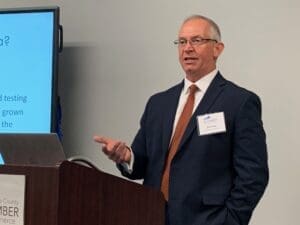

Delaware Marijuana Commissioner Rob Coupe, right, talks to potential licensees after his talk Wednesday at the New Castle County Chamber of Commerce.
As Delaware moves toward 2025 retail sale of recreational marijuana, lots of moving parts require decisions and implementation, the state’s Marijuana Commissioner told a packed New Castle County Chamber of Commerce meeting Wednesday.
Among those fine points are creating a digital infrastructure, formalizing regulations; and creating ways for people to apply for licenses, Rob Coupe said in a wide-ranging and detailed presentation.
The state also must decide whether and how the medical marijuana industry will coexist with legal marijuana, he said.
One good thing about Delaware’s timing, Coupe noted, is that the state can watch what New York, New Jersey, Maryland and other states have done and adopt their good ideas and try to avoid problems.
The new law
The new law allows people who are 21 or older to own 1 ounce of marijuana for personal use, but still prohibits consuming it in public or in a car.
Instead of the ounce of flower buds to smoke, the law will allow 12 ounces of concentrated marijuana or 750 milligrams of TCH, the active ingredient in pot, which covers edibles, oils and other forms of marijuana.
It prohibits growing marijuana for personal use or selling marijuana.
Four types of licenses related to the industry will be granted: growing, manufacturing, retail and testing. In every category, some licenses will be for social equity owners, who are people said to be unfairly impacted by drug laws that were not equally enforced, especially across racial lines.
Only about half the people who use marijuana smoke it, Coupe said. That’s because the fire ends up consuming more of the weed than they want. So about half of Delaware retail offerings will be in other forms, he said.
Medical marijuana sales, which are not taxed, were $49 million in 2022 with only 17,000 participants, Coupe said.
Recreational sales will be taxed at 15% when sales begin in 2025, and the state expects to have between 100,000 to 180,000 users, Coupe said..
Members of the Delaware Economic and Finance Advisory Committee were told Monday that the tax on recreational marijuana is expected to generate about $8 million in 2025 but that money would not go into the General Fund.
Coupe – who brought a notebook containing a printout of the laws – noted that the tax money is required to be used to support the Office of the Marijuana Commissioner, the Marijuana Regulation Fund and the Justice Reinvestment Fund.
But, he pointed out, the law also says that any remaining money may be appropriated by the General Assembly as it sees fit, and he thought that meant it would go back to the General Fund.


Marijuana Commissioner Rob Coupe gave the audience a primer on the law and a look at what has to be done to create Delaware’s recreational marijuana industry.
Creating the system
The law authorized 14 jobs to create and oversee the recreational sales program.
They included:
- 5 for the Office of Marijuana Commissioner, including Coupe.
- 14 for Delaware Alcohol and Tobacco Enforcement.
- 7 for the Department of Revenue
- 2 for the Department of Agriculture
- 6 in Health Systems Protection for the Division of Public Health.
Those jobs are being filled, Coupe said.
Three large-scale IT programs are needed for the system to operate, Coupe said.
One would track every plant grown in the system by giving each a barcode. Products created with them would carry the same bar code, allowing the plants to be traced. Growers who destroyed that plant would be required to report it.
A request for proposal for that system is expected to go out soon.
The second system is a data analytics program that could be used for revenue predictions and also be mined for anomalies and violations. It would be an investigative tool to allow regulators to look for diversion or inversion of products.
The third would be license application software to receive, score and track license applications. A state contract with Salesforce will handle that job.
Licenses
The state expects regulations to be finalized by July 5, 2024, so license applications can be accepted starting Aug. 5 and licenses can begin to be issued Sept. 5.
A lot of the mechanisms in the laws setting up the industry are based on the system used to for alcohol sales, Coupe said.
That includes prohibiting the retail pot shops from being open on Thanksgiving, Christmas and Easter.
Retail businesses also will have to pay for an additional license for the shops to be open on Sundays.
The state will offer 125 licenses. They include:
- 60 cultivation facility licenses for indoor and outdoor growing operations. For less than 2,500-square-foot grow canopy (about an acre outside) there will be 20 microbusiness and 10 social equity licenses. For greater than 2,500 feet, there will be 20 open and 10 social equity licenses. Open licenses means anyone from any state can apply.
- 30 product manufacturing facility licenses. They will create gummies, candies, oils and other non-leaf products. 10 will be for social equity applicants, 10 for microbusiness and 10 open.
- 30 retail store licenses, with 15 open and 15 social equity.
- 5 testing facilities. Those are labs that ensure Delaware’s marijuana products met its stringent guidelines. Three licenses will be open and two will be social equity.
Medical marijuana providers must pay a license fee of $40,000 every two years for a vertical integration of several services, Coupe said.
Everyone who applies for open medical marijuana or recreational marijuana licenses must pay $5,000 to apply. That amount was set to prevent people who were not serious about the business from applying and taking up valuable regulator time, Coupe said.
A Social Equity application will be $1,000 and a microbusiness application will be $3,000.
If awarded a license, open license fees will be $10,000 while Social Equity and Microbusiness licenses will be $6,000, a 40% discount.
A Sunday Sales license will be an additional $500 every two years.
Delaware is known for its stringent product testing, and its tolerance for the presence of things like pesticides and molds is much lower than the average state.
Department of Public Health marijuana regulators test for mold, yeast, bacteria, heavy metals, pesticides, myotoxins – which produce fungus – and cannabinoid compounds such as THC, CBD and CBG.
He pointed to a recent study in the Journal of Cannabis Research that found that 92% of unregulated or illicit market cannabis tested positive for pesticides, but only 6% of regulated ones did.


Coupe was bombarded with questions from people who want to particpate in the industry.
If marijuana is rescheduled
Coupe said the state is waiting to see if marijuana is moved to a lower category of drugs by the federal government.
Proponents have said they have the votes to move marijuana from Schedule 1, which are drugs with a high potential for abuse, to Schedule 3, which are drugs with a moderate to low potential for physical and psychological dependence.
But that hasn’t happened, Coupe pointed out.
If marijuana is rescheduled, Delaware will be affected, Coupe said.
The move would not legalize marijuana, but it would make it legal to buy marijuana elsewhere and transport it across state lines.
Growers and manufacturers would be eligible for tax breaks now denied them, he said.
And more research could be done on marijuana, including whether and how it interacted with medications, he said.
Not knowing that, some doctors refuse to prescribe medical marijuana for their patients, Coupe said.
Moving the drug to a lower schedule may also make it easier for licensees to find financial backing.
Coupe said most banks will not give loans to a business based on a Schedule I drug, so they had to seek investors, who could charge higher rates.
One man who said his company had just gotten a license in New Jersey said that warehouse owners were telling people they could rent their property, but had to guarantee them 10% of the business.
“Capitalism presents a lot of challenges,” Coupe said.
Medical marijuana
Coupe believes the medical marijuana industry will continue to exist, and some of the existing sites also may sell recreational marijuana.
Many people want medical marijuana to continue, he said, partly because those users can buy more marijuana at one time to cope with their various illnesses.
The law will allow recreational users to buy one ounce of marijuana for personal use at a time.They will have to show a driver’s license, but the licenses will not be tracked and the purchase essentially is anonymous, Coupe said.
Medical marijuana users are allowed to buy three ounces of marijana or marijuana products every two weeks. Their purchases are tracked, and they are allowed to own six ounces at a time.
Nothing will stop a recreational user from buying more than one ounce in a day by going to another shop, or several shops, except getting caught with all it in their possession, Coupe said.
The onus will be on the retail shop to remember a person who returns to buy more in a day. They must refuse to sell it to that person, he said.
Discussions have been taking place about how the recreational and medical marijuana system will work, he said.
It may be, he said, that both programs move into his office, which is under the Delaware Department of Safety and Homeland Security, so they can be managed in tandem.
Local control
Licensees will have to abide by local government rules.
While local governments must recognize the legalization of marijuana, they do not have to allow related businesses to set up in their jurisdiction, Coupe said.
Many towns fear property declines, the smell of marijuana and more, he said.
He showed photos of one medical marijuana grower who had vastly improved the area around his warehouse.
Warehouses and growing sites often use some kind of filtered ventilation that prevents smells from drifting into the air, he said.
New marijuana businesses will also need access to large amounts of electricity and water, he noted.
Because Delaware prohibits pesticides, they must use organic growing methods.
It is legal for a municipality to declare that none of the businesses are allowed in town or, if they are, may not be within a certain distance of a church or school.
Local governments also can declare that they don’t mind having a growing, manufacturing or testing facility, Coupe said, but do not want a retail store in their jurisdiction.


Betsy Price is a Wilmington freelance writer who has 40 years of experience, including 15 at The News Journal in Delaware.
Share this Post



